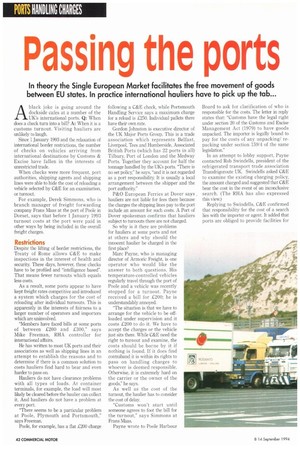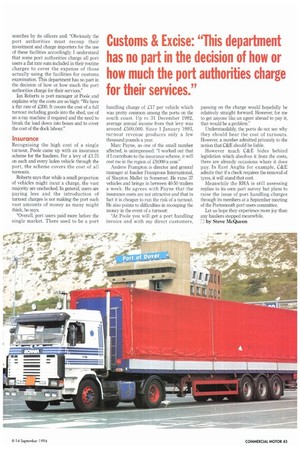Passing the ports
Page 44

Page 45

If you've noticed an error in this article please click here to report it so we can fix it.
In theory the Single European Market facilitates the free movement of goods between EU states. in practice international hauliers have to pick up the tab...
Ablack joke is going around the dockside cafes at a number of the UK's international ports. Q: When does a check turn into a bill? A: When it is a customs turnout. Visiting hauliers are unlikely to laugh.
Since 1 January 1993 and the relaxation of international border restrictions, the number of checks on vehicles arriving from international destinations by Customs & Excise have fallen in the interests of unrestricted trade.
When checks were more frequent, port authorities, shipping agents and shipping lines were able to hide the cost of reloading a vehicle selected by C&F. for an examination, or turnout.
For example, Derek Simmons, who is branch manager of freight forwarding company Frans Maas at the port of Poole in Dorset, says that before 1 January 1993 turnout costs at the port were paid in other ways by being included in the overall freight charges.
Restrictions
Despite the lifting of border restrictions, the Treaty of Rome allows C&F. to make inspections in the interest of health and security. These days, however, these checks have to be profiled and "intelligence based". That means fewer turnouts which equals less costs.
As a result, some ports appear to have kept freight rates competitive and introduced a system which charges for the cost of reloading after individual turnouts. This is apparently in the interests of fairness to a larger number of operators and importers which are uninvolved.
"Members have faced bills at some ports of between £200 and 1300," says Mike Freeman, RHA controller for international affairs.
He has written to most UK ports and their associations as well as shipping lines in an attempt to establish the reasons and to determine if there is a common solution to costs hauliers find hard to bear and even harder to pass on.
Hauliers do not have clearance problems with all types of loads. At container terminals, for example, the load will most likely be cleared before the haulier can collect it. And hauliers do not have a problem at every port.
"There seems to be a particular problem at Poole, Plymouth and Portsmouth," says Freeman.
Poole, for example, has a flat £200 charge following a C&E check, while Portsmouth Handling Service says a maximum charge for a reload is £250. Individual pallets there have their own rate.
Gordon Johnston is executive director of the UK Major Ports Group. This is a trade association which represents Belfast, Liverpool, Tees and Humberside, Associated British Ports (which has 22 ports in all) Tilbury, Port of London and the Medway Ports. Together they account for half the tonnage handled by the UK's ports. "There is no set policy," he says, "and it is not regarded as a port responsibility. It is usually a local arrangement between the shipper and the port authority."
P&O European Ferries at Dover says , hauliers are not liable for fees there because the charges the shipping lines pay to the port include an amount for such costs. A Port of Dover spokesman confirms that hauliers subject to turnouts there are not charged.
So why is it there are problems for hauliers at some ports and not at others and why should the innocent haulier be charged in the first place?
Marc Payne, who is managing director of Armoric Freight, is one operator who would like the answer to both questions. His temperature-controlled vehicles regularly travel through the port of Poole and a vehicle was recently stopped for a turnout. Payne received a bill for £200; he is understandably annoyed.
"The situation is that we have to arrange for the vehicle to be offloaded under supervision and it costs £200 to do it. We have to accept the charges or the vehicle just sits there. While C&E. need the right to turnout and examine, the costs should be borne by it if nothing is found. If it does find contraband it is within its rights to pass on handling charges to whoever is deemed responsible. Otherwise, it is extremely hard on the carrier or the owner of the goods," he says.
As well as the cost of the turnout, the haulier has to consider the cost of delay.
"Customs won't start until someone agrees to foot the bill for the turnout," says Simmons at Frans Maas.
Payne wrote to Poole Harbour
Board to ask for clarification of who is responsible for the costs. The letter in reply states that: "Customs have the legal right under section 20 of the Customs and Excise Management Act (1979) to have goods unpacked. The importer is legally bound to pay for the costs of any unpacking/ repacking under section 159/4 of the same legislation."
In an attempt to lobby support, Payne contacted Rob Swindells, president of the refrigerated transport trade association Transfrigoroute UK. Swindells asked C&E to examine the existing charging policy, the amount charged and suggested that C&E bear the cost in the event of an inconclusive search. (The RHA has also expressed this view.) Replying to Swindells, C&E confirmed that responsibility for the cost of a search lies with the importer or agent. It added that ports are obliged to provide facilities for searches by its officers and: "Obviously the port authorities must recoup their investment and charge importers for the use of these facilities accordingly I understand that some port authorities charge all port users a flat rate sum included in their routine charges to cover the expense of those actually using the facilities for customs examination. This department has no part in the decision of how or how much the port authorities charge for their services."
Ian Roberts is port manager at Poole and explains why the costs are so high: "We have a flat rate of £200. It covers the cost of a full turnout including goods into the shed, use of an x-ray machine if required and the need to break the load down into boxes and to cover the cost of the dock labour."
Insurance
Recognising the high cost of a single turnout, Poole came up with an insurance scheme for the hauliers, For a levy of £1.75 on each and every laden vehicle through the port, the scheme covers the cost of all turnouts.
Roberts says that while a small proportion of vehicles might incur a charge, the vast majority are unchecked. In general, users are paying less and the introduction of turnout charges is not making the port such vast amounts of money as many might think, he says.
"Overall, port users paid more before the single market. There used to be a port
handling charge of £17 per vehicle which was pretty common among the ports on the south coast. Up to 31 December 1992, average annual income from that levy was around £500,000. Since 1 January 1993, turnout revenue produces only a few thousand pounds a year.
Marc Payne, as one of the small number affected, is unimpressed: "1 worked out that if I contribute to the insurance scheme, it will cost me in the region of £9,000 a year."
Andrew Frampton is director and general manager at haulier Framptons International, of Shepton Mallet in Somerset. He runs 37 vehicles and brings in between 40-50 trailers a week. He agrees with Payne that the insurance costs are not attractive and that in fact it is cheaper to run the risk of a turnout. He also points to difficulties in recouping the money in the event of a turnout: "At Poole you will get a port handling invoice and with my direct customers, passing on the charge would hopefully be relatively straight forward. However, for me to get anyone like an agent abroad to pay it, that would be a problem."
Understandably, the ports do not see why they should bear the cost of turnouts. However, a number admitted privately to the notion that C&E should be liable.
However much C&E hides behind legislation which absolves it from the costs, there are already occasions where it does pay. In East Anglia for example, C&E admits that if a check requires the removal of tyres, it will stand that cost.
Meanwhile the RHA is still assessing replies to its own port survey but plans to raise the issue of port handling charges through its members at a September meeting of the Portsmouth port users committee.
Let us hope they experience more joy than any hauliers stopped meanwhile.
0 by Steve McQueen




























































































